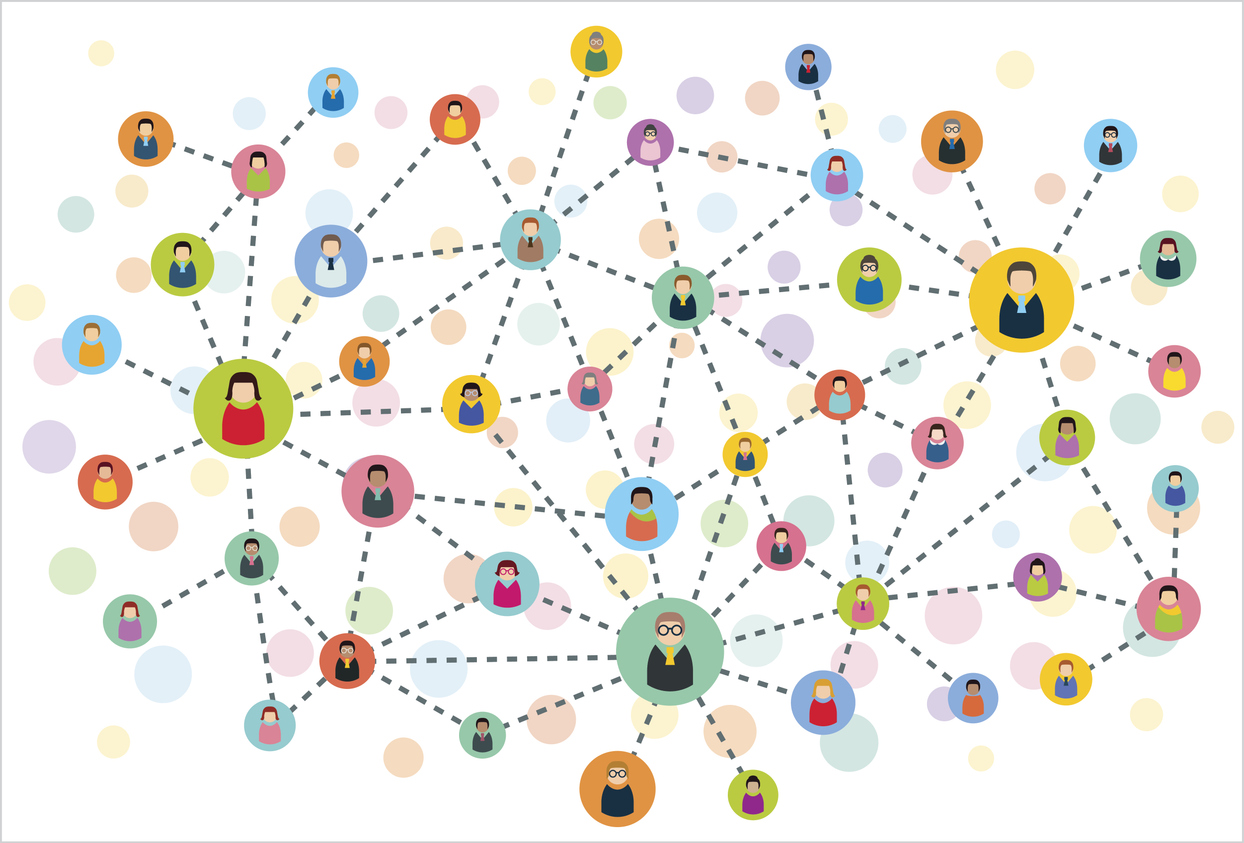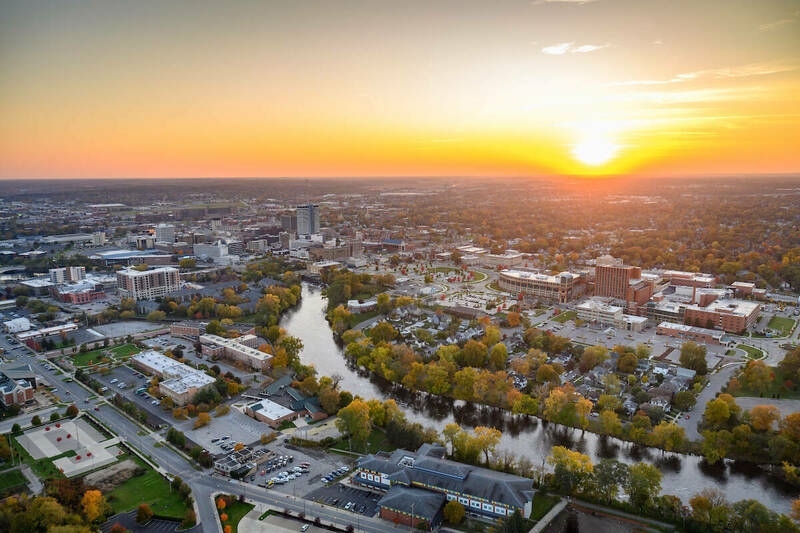
Some problems require solutions too ambitious to tackle without help from both longtime and new partners. That’s when multisector collaborations come in: powerful initiatives that unite stakeholders from across academia, local government, nonprofits and the business community.
Getting everyone to the table — let alone getting them to listen, compromise and work together — isn’t easy, but that’s often what produces outside-the-box results. The Notre Dame Deloitte Center for Ethical Leadership (NDDCEL) is connecting innovative academic research with business and society in practice with the mission of working toward more just, flourishing communities.
Based in the Mendoza College of Business, the NDDCEL embraces partnerships that are central to the success of the University of Notre Dame and the region that surrounds it.
In our discussions with public and private sector leaders in the region, there has been wide agreement that collaborative action leads to more equitable and prosperous communities. We’ve seen that come to life with initiatives like iNDustry Labs, which builds relationships with South Bend-Elkhart region companies using the University’s expertise in partnership with community leaders to unlock greater business value, serve as models for programming that benefits everyone.
To learn more about how business leaders (in the region and beyond its borders) can drive win-win collaborations, we asked three changemakers to share their insights, achievements and pain points when it comes to multisector initiatives:

Claude Griffin
Executive Director at United States Business Council for Sustainable Development

Bethany Hartley
(EMBA ‘26), President and CEO, South Bend - Elkhart Regional Partnership

Regina Emberton
CEO, ChoiceLight Inc.
Claude Griffin, Executive Director at United States Business Council for Sustainable Development
When the NDDCEL convened regional leaders in Chicago in 2023 for its annual Fall Forum, it tapped the United States Business Council to offer expert insights into regional area economic development. For more than 25 years, the Business Council has worked to scale solutions to challenges in energy, carbon, materials and ecosystems.
“We help connect the dots between what's happening in academia with the community,” Executive Director Claude Griffin explained.
The Business Council includes academics who help make programs even more impactful with their knowledge of the latest research. That can mean everything from speaking at events — something Griffin has done as a featured expert at the annual NDDCEL Forum — to co-hosting conferences, placing interns with Business Council member organizations or actively partnering on the ground.
At the Council’s annual meeting, members identify the biggest sustainability challenges facing companies across industries. Drawing on his experience at Shell in environmental performance, Griffin provides leadership that ensures every stakeholder feels recognized and heard.
“We work with our partners to design projects that produce results, and every one of our initiatives is designed to deliver economic, environmental and social benefits,” Griffin said.
For example, in East Texas, the Small Landowner Carbon Collective brings together the Business Council, Prairie View A&M University and nonprofit carbon registry BCarbon with local farmers. All of these players are committed to making farms more profitable while reducing carbon emissions through sustainable forestry practices. Initial funding came from the Bia Echo Foundation, with Phase Two funded by the USDA Forest Service.
“The objective here is to establish a cooperative where small acreage landowners can aggregate the acreage of their forests and soils and enter the acreage in emergent private markets for climate mitigation as well as forest resilience, which becomes an additional revenue stream for them,” Griffin explained. Like all Business Council initiatives, the model is designed to be scalable and replicable across the U.S. and internationally.
Griffin is also eager to expand programming in the Midwest. One obvious opportunity is the Council’s Materials Marketplace, which won the Circulars Digital Disruptor award at the 2016 World Economic Forum. So far, 2,200 businesses have used the platform to post listings of reusable or recyclable materials, diverting more than 5,500 tons from landfills. More companies are signing up to participate. The US BCSD has convened multisector circular economy projects in six cities since 2015.
We help connect the dots between what's happening in academia with the community.
Claude Griffin, Executive Director, USBCSD
Bethany Hartley (EMBA ‘26), President and CEO, South Bend - Elkhart Regional Partnership
Bethany Hartley understands the power of multi-sector collaborations with academia firsthand. Last year, she went back to school as a student in the Notre Dame Executive MBA program at Mendoza College of Business with the goal of gaining the skills to find increased opportunities for global connectivity and economic development for the region.
 While working in entrepreneurship education, Hartley first got involved with the Regional Partnership seven years ago as a volunteer before eventually joining the staff.
While working in entrepreneurship education, Hartley first got involved with the Regional Partnership seven years ago as a volunteer before eventually joining the staff.
“Everyone who works here said the same thing in our job interview, that we want to make an impact on the place where we live. That’s what we get to do every day,” Hartley said.
The Partnership brings together five counties and “drives initiatives in workforce development, talent retention, entrepreneurship and industry growth, leveraging the region’s strong manufacturing base.”
There’s an ongoing challenge when it comes to attracting people to the area — and keeping them employed there. Hartley referenced a 2021 Brookings Institution report noting how susceptible Indiana’s workforce is to automation and AI. “We’re a heavy manufacturing region. That's where things like the skills accelerator come up, where we are trying to get current employees reskilled or upskilled,” she explained.
The Partnership started as a multi-county organization. It required leadership from the University and from leaders across 47 Elkhart and Marshall counties to come together with a willingness to collaborate for the betterment of the region.
Hartley said, "Those efforts paid off when the organization was awarded $42 million from the Indiana Economic Development Corporation through the Regional Cities Initiative in 2015. The trajectory was further affirmed by receiving two rounds of READI funding in 2021 and 2024, adding another $95 million of state grants into the region.”
Hartley and her team have since supported projects like expanding the Potawatomi Zoo in South Bend, Indiana. “That’s an example of private investment coming alongside public grants that have made the region a tourist destination and also enriched the lives of residents. That’s the perfect combination that we look for when we think about projects,” Hartley said.
“Economic development isn't a social service nonprofit,” she cautioned. “It’s a business-focused nonprofit model, and so sometimes it takes years to see the impact of what we've done today. But you do eventually see it." She looked out her office window with a smile. “You can see the impact in the cities’ skylines in our region.”
The Partnership works with 12 higher education institutions in Indiana and Michigan, including the University of Notre Dame, through its Higher Education Advisory Council. Notre Dame’s Senior Assistant Provost Jim Frabutt sits on the council. Multiple faculty members also serve on its committees to lend their expertise.
The Partnership is headquartered in a former Studebaker building and often hosts Notre Dame faculty retreats. “What it represents is them coming off campus to spend time in the South Side of town,” Hartley said. “They’re seeing the city and coming into a building where they might have previously assumed that nothing was happening and we are changing their perception.”
....Sometimes it takes years to see the impact of what we've done today. But you do eventually see it. You can see the impact in the cities’ skylines in our region.
Bethany Hartley, President and CEO, SBERP
Regina Emberton, CEO, ChoiceLight Inc.
Regina Emberton served as the first CEO of the South Bend - Elkhart Regional Partnership, where she was a mentor to Hartley for years before passing the torch and becoming CEO of ChoiceLight Inc, an organization whose board she had previously served.
A nonprofit with a for-profit affiliate, ChoiceLight is creating the infrastructure that regional businesses, schools and startups need to access the fastest, most reliable and affordable internet through its fiber-optic connection services.
Emberton said that ChoiceLight plays a role in supporting community and economic development in two main ways: First, by expanding access to reliable internet for schools, municipalities, and businesses — including in rural and low-income areas — through support for grants, infrastructure, and broadband expansion efforts. Second, by leveraging broadband as a competitive advantage for local and regional economic development.
“To adopt these new technologies like AI, people need more broadband bandwidth, and so that's where we come in. The way that we're structured is vendor neutral, so any internet service provider or company is able to lease our dark fiber and have the flexibility to light it with whatever equipment that they want,” Emberton said.
Notre Dame was one of ChoiceLight’s founding members in 2004, offering the organization access to its network of underground tunnels as spaces to run its cables and helping it get fast enough internet to be able to hit its goal of becoming a major research institution — a vision requiring infrastructure to match.
During the COVID pandemic, the digital divide in the region really came to light. Those with quick internet access could attend online school, while those without could not do so reliably and often fell behind academically. Ultimately, Notre Dame and other partners collaborated with ChoiceLight through another multi-sector program, enFocus, to build a private LTE network to ensure that students in 1,000 local households had more reliable access.
Most recently, ChoiceLight has linked up with Notre Dame’s Wireless Institute as a stakeholder on a Regional Tech Hubs Strategy Development Grant awarded by the U.S. Economic Development Administration. “It’s an excellent example of multisector collaboration,” Emberton said. “Nick Laneman, co-director of the Institute, and his team have engaged so many different people across the region, including private companies and basically anyone engaged in tech and AI and infrastructure. He is bringing this group together to develop a grant proposal for our region to become designated as a federal tech hub.”
Notre Dame was one of ChoiceLight’s founding members in 2004, offering the organization access to its network of underground tunnels as spaces to run its cables and helping it get fast enough internet to be able to hit its goal of becoming a major research institution — a vision requiring infrastructure to match.
Want To Nurture Multisector Collaborations in Your Region?
Just Show Up: You can’t expect other leaders to do the work. Get involved by consistently attending local meetings and public forums to help shape your community’s future and create incentives that allow your employees to contribute their time and expertise as well.
Facilitate Tolerance: Bring diverse voices together, encouraging compromise and collaboration even when there's not total agreement as long as no one is compromising their core values. “Someone once told me something that stuck with me: You don't always have to agree 100% but if you could tolerate it, then we can probably keep going forward,” said Hartley.
Connect the Dots: Griffin noted that it often takes multiple meetings before the kernel of a multi-sector collaboration becomes apparent to everyone. Use your network to connect people and ideas around the table, understanding that meaningful progress takes time and a shared purpose.
Leave a Local Legacy: Instead of hiring vendors or contractors from other countries or states, Emberton urges business owners to look local. You can help make local startups and small businesses more sustainable and contribute to making your community one that offers even more amenities and resources.